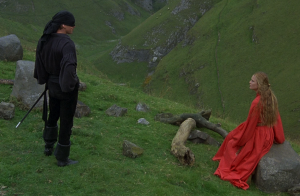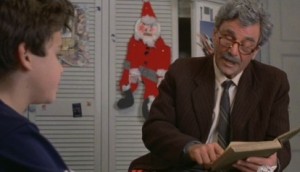As You Wish: THE PRINCESS BRIDE
 I asked our readers what I should watch (and review) for Valentine’s Day, and The Princess Bride was nominated. Some people in my college dorm watched the film back in 1991 ad nauseum and put a bad taste in my mouth for this 1987 Rob Reiner movie, but the reality remains that the fanciful film is an enduring classic for men and women, boys and girls of all ages in all ages. Examining the narrative, is it any wonder why?
I asked our readers what I should watch (and review) for Valentine’s Day, and The Princess Bride was nominated. Some people in my college dorm watched the film back in 1991 ad nauseum and put a bad taste in my mouth for this 1987 Rob Reiner movie, but the reality remains that the fanciful film is an enduring classic for men and women, boys and girls of all ages in all ages. Examining the narrative, is it any wonder why?
“It was the book my father used to read to me when I was sick, and I used to read it to your father. And today I’m gonna read it to you.”
As the story opens with a jaded, video-game playing grandson irritated by his grandpa’s visit, the romantic notion that there is a story told by father to son, generation to generation, one being passed down that is about “true love” either makes us roll our eyes or warms our heart. Would that there might be a story worth teaching “diligently to your children, and shall talk of them when you sit in your house, and when you walk by the way, and when you lie down, and when you rise” – Deuteronomy 6. Maybe it might even be a story that, as the grandfather promises, contains “fighting, torture, revenge, giants, monsters, chases, escapes, true love, miracles…”
(I can think of another particular, real story that contains ALL of these. Can you? Or maybe you’re like the grandson, who is certain this old story has nothing that will satisfy?)
The story within the story begins and we’re introduced to the protagonist, Westley. His loving attributes are laid bare within the first few minutes of the film: the girl Buttercup is verbally abusive and looks down on him, yet he is a humble servant to her, enduring her ways until she is slowly won over by his steadfast humility and faithfulness. He loves Buttercup until she is lovely.
 Swearing his undying love, Westley departs and promises to return. However, Buttercup is told he’s never coming back, and that the Prince of the realm intends to make her HIS bride. She has lost hope in everlasting love, and resigned herself to this life.
Swearing his undying love, Westley departs and promises to return. However, Buttercup is told he’s never coming back, and that the Prince of the realm intends to make her HIS bride. She has lost hope in everlasting love, and resigned herself to this life.
Naturally, Westley appears again, yet Buttercup does not recognize him for who he is. When she confesses her ongoing and unswerving love for him, he stands revealed. Yea, though she walks through the valley of the shadow of the fire swamp, she need not fear (the fire spurts, the lightning sands, or the rodents of unusual size) because Westley is with her. She lacks faith, but his unassailable and unswerving confidence spurs her on. She realizes that “My Westley will always come for me!”
On the road to justice and reclaiming his bride, Westley encounters Fezzik and Inigo: men who have lost their way and fallen in with bad company. Westley sees their potential and as the story progresses their course is altered, they wind up fighting alongside him and employing their gifts to help him rescue Buttercup and take down the evil kingdom of Humperdink.
Naturally, the story even includes torture and painful death death for Westley – he experiences what Count Rugen describes as “ultimate suffering” – followed by resurrection (though technically he was only “mostly dead”). As he rescues Buttercup, he also promises the evil Humperdink he will NOT face simply death, but “the pain”.
“It means I leave you in anguish, wallowing in freakish misery forever.”
 What primary hope, dream, myth or reality is The Princess Bride parodying and personifying?
What primary hope, dream, myth or reality is The Princess Bride parodying and personifying?
- We have a hero who is humble and patient with those undeserving, yet not out of weakness, as we see he can triumph over the greatest strength, skill, and mind.
- We’re shown a hero who appears in a form we don’t expect, revealed as savior when no one else can help, ably overcoming all obstacles in a way that not only proves true love, but demonstrates its supremacy over all.
- He alters the course of men, and kingdoms, beats (mostly) death itself, and threatens eternal torment for those who would dare plot harm for his bride.
“…and as the bridegroom rejoices over the bride, so shall your God rejoice over you.” – Isaiah 62:5
For the Christian, this comedy lightly treads in the narrative steps of Jesus, savior and bridegroom to his bride the church. It captures so many facets – with tongue in cheek – that it’s “inconceivable” not to notice. For husbands who view this as a chick flick, treat your wife to a re-viewing of the film and appreciate it at a deeper level of why it strikes a chord in our hearts.
Some men balk at the notion, for fear it feminizes us. The mystery of Christ and the church being likened to bridegroom and bride doesn’t mean we’re literally the collective wife of Jesus. However, whether we’re a damsel or dude-sel, the truth is that in life’s narrative we ARE the one’s in distress, tied to life’s train tracks and in need of a savior.
 We’d like to BE Westley, but we’re a lot more like Buttercup when it comes to our standing and need. However, the film makes sure that our definition of true love truly transcends the romantic in the final scene, as the Grandfather answers his grandson’s request with Westley’s classic “as you wish”. As Buttercup mistreated Westley, the grandson begins equally dismissive, unappreciative. Grandpa isn’t just reading the story, he’s seeking to image the hero, to be an image-bearer of that perfect man, humbly serving his grandson.
We’d like to BE Westley, but we’re a lot more like Buttercup when it comes to our standing and need. However, the film makes sure that our definition of true love truly transcends the romantic in the final scene, as the Grandfather answers his grandson’s request with Westley’s classic “as you wish”. As Buttercup mistreated Westley, the grandson begins equally dismissive, unappreciative. Grandpa isn’t just reading the story, he’s seeking to image the hero, to be an image-bearer of that perfect man, humbly serving his grandson.
Here’s hoping that, in our own chapter of the story, we’re seeking to be a little like Grandpa. And that we really mean it.
“Anybody want a peanut?”



